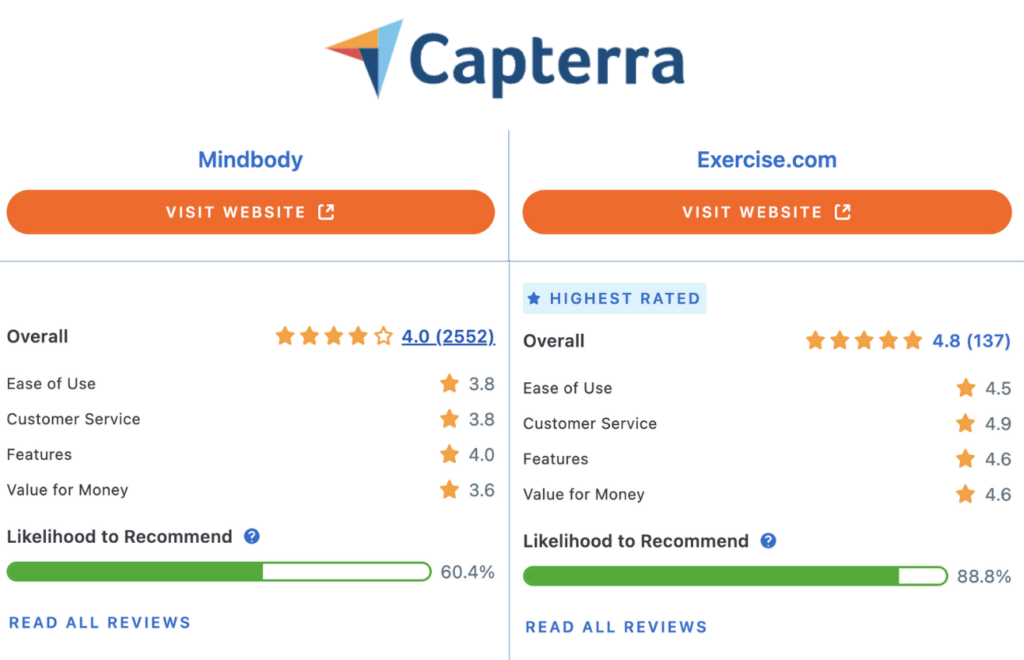What is the Mindbody business model?
Mindbody operates on a Software-as-a-Service (SaaS) business model, offering subscription-based software solutions to fitness, wellness, and health businesses.

Mindbody provides tools for scheduling, payment processing, client management, and marketing, catering primarily to boutique studios, yoga centers, gyms, and spas. Mindbody generates revenue through monthly subscription fees, transaction fees, and add-on services, such as premium features or integrations (including via ClassPass, acquired by Mindbody in 2021).
| Key Aspect | Mindbody | Exercise.com | Notes |
|---|---|---|---|
| Business Model | SaaS, subscription-based | SaaS, subscription-based | Both platforms serve fitness and wellness industries |
| Target Market | Boutique studios, yoga, wellness, and spas | Fitness, gyms, yoga, martial arts, personal training | Exercise.com supports a broader range of businesses |
| Revenue Streams | Subscriptions, transaction fees, add-ons | Transparent pricing, scalable plans | Exercise.com offers more flexibility |
| Customization | Limited options for branding | Fully customizable | Exercise.com provides more tailored solutions |
Mindbody’s business model relies on subscriptions, transaction fees, and add-ons, which may not align with the needs of every business. For a fully customizable, scalable, and cost-effective solution, Exercise.com is the best gym management software for fitness professionals.
Schedule a demo today to see how Exercise.com can transform your business operations and help you grow!

Core Components of the Mindbody Business Model

Mindbody Subscription-Based Revenue
Mindbody’s primary revenue source comes from monthly subscription fees, which vary based on the features and capabilities of each plan. Pricing typically ranges from $129 to $599+ per month, depending on the tier.
- Basic Plans: Offer essential tools for scheduling, payments, and client management.
- Advanced Plans: Include additional features like reporting, marketing, and premium integrations.
- Concerns: Businesses often find the higher-tier plans expensive, especially small studios or gyms.
For a more affordable solution, the best Mindbody alternative for fitness offers transparent pricing that scales with your business.
Mindbody Transaction Fees
Mindbody charges processing fees for payments made through its platform. These fees typically range from 2.75% to 3.5% per transaction, which can significantly impact profitability for businesses with high transaction volumes.
- Additional fees may apply for ACH transactions or premium payment processing features.
- Businesses processing large volumes of payments often seek platforms with lower or more flexible transaction fees.
Exercise.com, as the best gym management software, provides customizable payment options and transparent transaction pricing.
Mindbody Add-On Services and Features
Mindbody generates additional revenue by offering premium services and integrations as optional add-ons. Examples include enhanced marketing tools, reporting capabilities, and custom branding for the mobile app.
- While these add-ons can be useful, they often come at an additional cost.
- Businesses may end up paying for features they don’t fully utilize.
The best yoga studio software and best martial arts software include comprehensive tools without hidden fees.
Mindbody and ClassPass Business Model

Here’s a table comparing the business models of Mindbody and ClassPass:
| Aspect | Mindbody | ClassPass |
|---|---|---|
| Primary Revenue Model | Subscription-based | Subscription-based |
| Target Audience | Wellness businesses | Fitness consumers |
| Core Offering | Business management software | Access to fitness classes |
| Subscription Tiers | $129 to $699 per month | $15 to $199 per month |
| Transaction Fees | Yes, for bookings and payments | 5% commission per class attended |
| Additional Revenue Streams | Payment processing, premium placement, add-on features | Pay-as-you-go options, cancellation fees |
| Partner Payments | N/A | Pay-per-class to partner studios |
| Corporate Services | Marketing suite, branded apps | Wellness programs for large companies |
| Recent Developments | Acquired ClassPass in 2021 | Integrated into Mindbody ecosystem |
While both Mindbody and ClassPass operate in the wellness industry, the Mindbody ClassPass business models target different segments. Mindbody focuses on providing software solutions to wellness businesses, while ClassPass connects consumers with fitness classes. This synergy has led to Mindbody’s acquisition of ClassPass, creating a comprehensive ecosystem for the wellness industry.
Mindbody’s business model is primarily based on a multi-faceted revenue approach:
- Subscription Fees: Mindbody offers tiered pricing plans for businesses, ranging from $129 to $699 per month, depending on the features and services required.
- Transaction Fees: The company generates revenue through integrated payment processing, though specific transaction fee rates are not publicly disclosed.
- Premium Placement Services: Businesses can pay for enhanced visibility on the Mindbody platform.
- Add-on Features: Additional revenue comes from services like the Mindbody branded app and marketing suite.
Regarding Mindbody marketing fees, while specific rates aren’t publicly available, the marketing suite is often an add-on feature that increases the monthly cost for businesses. This suite includes tools for email campaigns, text marketing, and automated client retention strategies.
ClassPass, acquired by Mindbody in 2021, operates on a different model:
- Subscription-Based: Users pay a recurring fee for access to a specified number of fitness classes per month at participating studios.
- Tiered Pricing: ClassPass offers various subscription tiers, allowing members to choose plans based on their needs and budget.
- Pay-As-You-Go Option: For users who prefer not to commit to a subscription.
- Corporate Wellness Programs: ClassPass offers enterprise services to large companies.
- Partner Payments: ClassPass pays partner studios on a per-class basis when members attend their classes.
This combined approach allows Mindbody to cater to both businesses and end-users in the wellness industry, creating a comprehensive ecosystem for fitness and wellness services.
Mindbody’s Target Market
Mindbody focuses primarily on small to medium-sized boutique businesses in the fitness and wellness space, such as:
- Yoga Studios: Offers class scheduling and client management tools.
- Boutique Fitness Studios: Provides booking and payment solutions.
- Spas and Wellness Centers: Includes appointment scheduling and retail management features.
While this focus has made Mindbody popular among boutique businesses, larger gyms, multi-location businesses, and niche industries may find its tools less flexible. Exercise.com serves a broader range of businesses, making it a more versatile alternative.
How does Mindbody make money?
Mindbody makes money through subscription fees for its fitness business management software, which ranges from basic to premium pricing tiers. It also earns revenue from Mindbody payment processing fees, which are applied to transactions made through its platform, and from its partnerships with businesses that use its marketing and booking tools to reach more customers. Additionally, Mindbody generates income by offering premium services, such as branded mobile apps and advanced analytics, at an additional cost. These diversified Mindbody revenue streams make it a lucrative platform for managing fitness businesses.
Mindbody generates revenue through multiple streams:
- Subscription Fees: Mindbody offers tiered pricing plans ranging from $129 to $699 per month, depending on the features and services required.
- Transaction Fees: The company earns revenue through integrated payment processing, though specific rates are not publicly disclosed.
- Marketplace Commissions: Mindbody takes a percentage of bookings made through its marketplace, with a 20% fee (capped at $30) for new client bookings.
- Premium Services: Additional revenue comes from add-on features like the Mindbody branded app, marketing suite, and professional services.
- Mindbody Capital: The company offers funding solutions to businesses, likely generating revenue through interest or fees.
- Third-party Product Sales: About 10% of recurring revenues come from selling third-party products (e.g., ConstantContact).
- Hardware Sales: Mindbody sells low-margin products like credit card readers, contributing to non-recurring revenue.
Mindbody’s goal is to become a “zero-cost software” for customers by driving revenue through its marketplace, potentially offsetting software costs for businesses that fully utilize the platform.
Read More:
- Best Mindbody Alternative
- Best Mindbody Alternatives for Fitness
- How to Use Mindbody
- Mindbody Pricing
- How to Cancel Mindbody
Why Exercise.com Is a Better Choice for Fitness Businesses

While Mindbody’s SaaS business model has been successful, it may not suit every fitness business. Exercise.com stands out as the best Mindbody alternative for fitness because it offers:
- Customizable Solutions: Fully tailor the platform to your business’s unique needs.
- Transparent Pricing: No hidden fees or extra costs for essential features.
- Comprehensive Tools: Includes scheduling, payments, client engagement, performance tracking, and more.
- Broader Market Support: Serves gyms, personal trainers, yoga studios, martial arts schools, and more.











